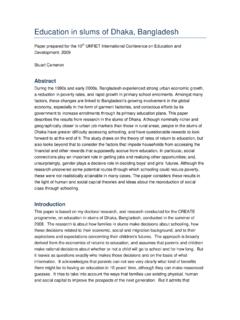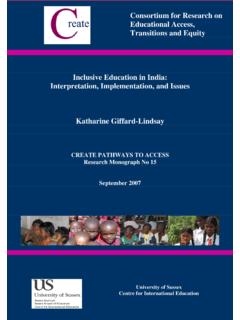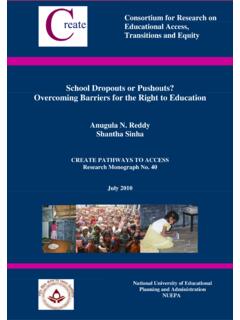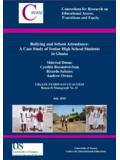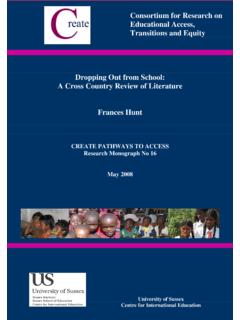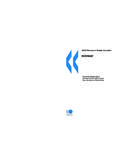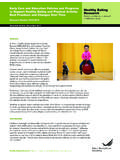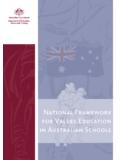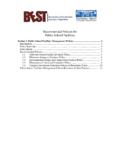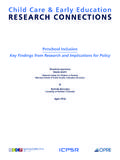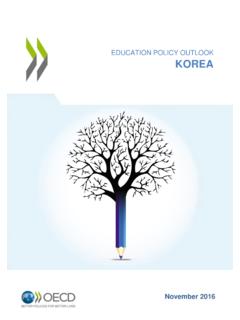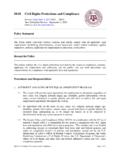Transcription of Policies on free primary and secondary education …
1 Consortium for Research on Educational Access, Transitions and Equity Policies on free primary and secondary education in East Africa: A Review of the Literature Moses O. Oketch and Caine M. Rolleston CREATE PATHWAYS TO ACCESS Research Monograph No 10 June 2007 Institute of education University of London The Consortium for Educational Access, Transitions and Equity (CREATE) is a Research Programme Consortium supported by the UK Department for International Development (DFID). Its purpose is to undertake research designed to improve access to basic education in developing countries.
2 It seeks to achieve this through generating new knowledge and encouraging its application through effective communication and dissemination to national and international development agencies, national governments, education and development professionals, non-government organisations and other interested stakeholders. Access to basic education lies at the heart of development. Lack of educational access, and securely acquired knowledge and skill, is both a part of the definition of poverty, and a means for its diminution.
3 Sustained access to meaningful learning that has value is critical to long term improvements in productivity, the reduction of inter-generational cycles of poverty, demographic transition, preventive health care, the empowerment of women, and reductions in inequality. The CREATE partners CREATE is developing its research collaboratively with partners in Sub-Saharan Africa and South Asia. The lead partner of CREATE is the Centre for International education at the University of Sussex. The partners are: The Centre for International education , University of Sussex: Professor Keith M Lewin (Director) The Institute of education and Development, BRAC University, Dhaka, Bangladesh: Dr Manzoor Ahmed The National University of Educational Planning and Administration, Delhi, India: Professor R Govinda The education Policy Unit, University of the Witwatersrand, South Africa: Dr Shireen Motala The Universities of education at Winneba and Cape Coast, Ghana: Professor Jerome Djangmah The Institute of education , University of London.
4 Professor Angela W Little Associate Partner: The Institute of Development Studies at Sussex Disclaimer The research on which this paper is based was commissioned by the Consortium for Research on Educational Access, Transitions and Equity (CREATE ). CREATE is funded by the UK Department for International Development (DFID) for the benefit of developing countries and is coordinated from the Centre for International education , University of Sussex. The views expressed are those of the author(s) and not necessarily those of DFID, the Institute of education , or the CREATE Team.
5 Copyright CREATE 2007 ISBN: 0-901881-22-8 Address for correspondence: CREATE, Centre for International education , Sussex School of education , University of Sussex, Falmer, Brighton BN1 9QQ, United Kingdom Tel: + 44 (0) 1273 678464 Fax: + 44 (0) 1273 877534 Author Emails: and Website: Email: Please contact CREATE using the details above if you require a hard copy of this publication Policies on free primary and secondary education in East Africa: A Review of the Literature Moses O. Oketch and Caine M. Rolleston CREATE PATHWAYS TO ACCESS Research Monograph No 10 June 2007 iContents v 1.
6 1 2. Immediate Post-Independence Policies on 4 Formulation of 8 8 13 15 17 3. Policy Implementation Strategies and 19 19 20 21 22 4. Policy Institutionalization, Replicability and Financial 24 24 26 28 5. Policy impact and implication on poorest 30 6. Policies on secondary education Access (CREATE Zone 4).. 33 7. Conclusion and Recommendations for Further Policy 36 38 ii List of Acronyms CREATE Consortium for Research on Educational Access.
7 Transitions and Equity DHS Demographic and Household Survey EAC East African Community EFA education for All ESR education for Self-Reliance FPE free primary education FDI Foreign Direct Investment FHS free High School GER Gross Enrolment Rate GPI Gender Parity Index IMF International Monetary Fund KANU Kenya African National Union KPE Kenya Preliminary Examination LEA Local education Authorities MDGs Millennium Development Goals NARC National Alliance Rainbow Coalition NAPE National Assessment of primary education NGO Non Governmental Organisation SAPs Structural Adjustment Programmes TANU Tanganyika African National Union TAPA Tanganyika African Parents Association TANU Tanzania African National Union UPE Universal primary education iii Acknowledgements Comments by Angela Little and Tony Somerset on earlier drafts were helpful.
8 None share responsibility for the review. Thanks also to Fran Hunt for editing and Elena Dennison for presentation of this report. iv Preface This research monograph is one of several in the CREATE Pathways to Access Series that address policy formulation and implementation. Specifically it reviews the international research literature on the formulation and implementation of Policies on free primary and secondary education in Kenya, Tanzania and Uganda since independence in 1963, 1961 and 1962 respectively.
9 The monograph addresses the origins of these Policies , and the increasing role, over time, of the international development community. What are the politics of policy formulation? How have polices changed over time, and why? In the immediate post independence period policy priority was given to the expansion of secondary and tertiary education in all three countries. But it was not long before competitive politics, social demand and faith in the role of education led to active Policies for Universal primary education in the late 1960s and early 1970s in Kenya and Tanzania.
10 While initial enrolment gains were rapid, both countries experienced setbacks subsequently. The reasons for this and the greater involvement of the international community in recent years are explored. The story of Uganda s rapid progress towards Universal primary education starts much later, in the mid 1990s, in the wake of the transition to democratic politics. The abolition of fees at different points has been critical in all three countries in increasing enrolments. Moses Oketch and Caine Rolleston offer an important contribution to our understanding of the underlying determinants of Policies for free primary and secondary education , the patterns of access that follow from specific Policies and the undermining of achievements in the context of economic decline on the one hand and the imposition of fees on the other.
